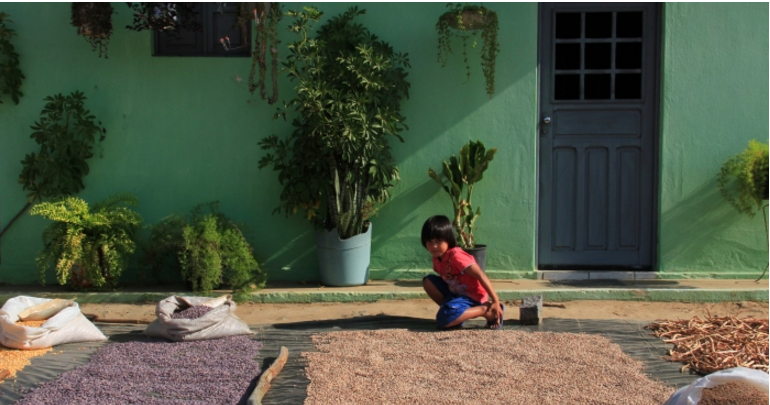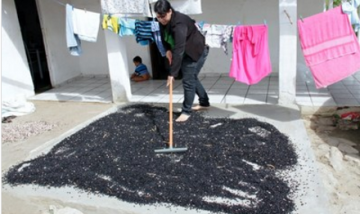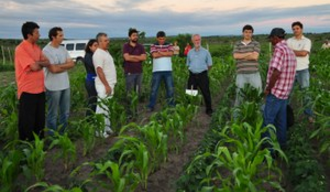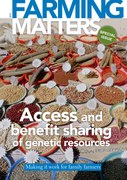Increasingly, seeds are the domain of professional breeders, agribusiness and policy makers. They decide what makes for a good variety and they develop legislation that excludes other varieties. Despite this, farmer organisations and social movements in Paraíba, Brazil, have managed to strengthen decentralised farmer-driven seed selection and distribution systems and public seed policies. They may well be opening the way for another seed regime in the country, with its own access and benefit sharing mechanisms.

Historically, crops have always adjusted to their natural and cultural environments. The outcome is the rich biocultural heritage that is agrobiodiversity. This process was disrupted when maximising yields became the major guiding principle in crop improvement. According to the dominant view, modern, agro-industrial technologies are needed to create and maintain the necessary environmental conditions for a crop to realise its full genetic potential.
Seed policy
The Brazil federal government and the state of Paraíba launched several programmes in accordance with this agronomic view, promoting varieties that respond well to intensive agrochemical application. Family farmers were encouraged to replace their wide array of local varieties of beans, corn, cassava and peanuts with a few so-called ’improved’ varieties. As these new varieties spread, agrobiodiversity declined.
This agricultural approach, or paradigm, was further institutionalised as new regulations defined what a ’seed’ is. According to Brazil’s seed law, certified varieties can only be commercialised if they are recognised by research institutes and agricultural commissions in the Ministry of Agriculture, which are strongly influenced by the economic interests of seed breeding companies. The country’s cultivars law (plant variety protection) sets stability, uniformity and homogeneity requirements on seeds in order to be registered as protected varieties.
There are various problems with this development. Local varieties carry high genetic variability, which is exactly what makes them so resilient to environmental stress. But until 2003 local varieties were not considered to be seeds and were called ‘grains’ instead. In addition, farmers had to use protected varieties in order to benefit from various support programmes, creating another huge disincentive for the use of indigenous varieties.
This has become an arena of struggle for agroecological farming. Agroecological production favours the use of ecological capital above external inputs, in which locally adapted varieties and agrobiodiversity play a key role. Also, contrary to the State’s seed policies, agroecology supports the creation of an increasingly autonomous agriculture, free from the workings of input markets and the agribusinesses that control these markets. The Paraiban Semi-arid Articulation (ASA-PB), a coalition of civil society organisations, has challenged this dichotomy by mobilising farmers and movements around ’seeds of passion’: local varieties that, in contrast to most of the seeds distributed by public programmes, are environmentally as well as culturally grounded.
Practices that enhance access

Practices that use and conserve agrobiodiversity in the Brazilian semi-arid region are an important livelihood strategy for family farmers. Although these practices take place everywhere, they were largely invisible, deemed irrelevant by dominant ideological and economic forces. This is why identifying and enhancing the visibility of these practices was a crucial first step. ASA-PB started this process in 1996. Lead by local farmers’ unions and advised by AS-PTA, a participatory appraisal was carried out with farmers to identify local bean varieties in the municipalities of Solânea and Remígio. Through this appraisal, the farmers identified 67 varieties of beans with different characteristics including resistance to droughts and pests, good taste, and acceptance in the market.
They also identified farmer driven mechanisms that enhance access, diversity and seed security. For example, farmers store their seeds and exchange them with other families, allowing for the free circulation of genetic material and of the knowledge associated with each variety in the communities. In another example, local church organisations established seed banks in the drylands of Paraíba in the 1970s proved highly effective in times of drought when crops failed and farmers’ own seed stocks were depleted. The bank lends seeds to the farmers which the farmers return, with a small percentage increase, after the harvest. For the organisations that are part of ASA-PB, understanding these practices was the first step towards enhancing the visibility of these mechanisms and scaling them up.
The local seed banks formed an important entry point for a new seed security system based on improved access and availability of diverse and high quality seeds. ASA-PB established the Seeds Network, a knowledge exchange platform around seed practices and agrobiodiversity conservation. This network links 230 seed banks in 61 municipalities, covering 6,500 family farms in Paraíba. During one of the network meetings, Joaquim de Santana, a farmers’ union representative coined the term ‘seeds of passion’. “Seeds of passion are those that are good, that adapt to our reality,” he said, “and people are only passionate about what is significant.”
Changing policy and politics
The Seeds Network formed a space for critical policy analysis and the promotion of alternatives. A drought in 1993 triggered a protest where ASA-PB and other social movements challenged the state’s measures that were based on the notion of ’tackling the effects of drought’. ASA-PB and others instead proposed another slogan: ’living with the semi-arid’. As a response, the state government launched a seed banks policy in order to reinforce existing community seed banks, and donated stocks of seeds as an impetus for communities to construct new seed banks. However, the banks were replenished with conventional rather than local seeds. After the drought of 1998/99, local seed banks were again refilled with conventional seeds, after which protests followed.
ASA-PB persuaded the government of Paraíba to acquire local farmer seeds for the following year. The initiative then stumbled against a legislative barrier: local seeds were not recognised as seeds and therefore could not be distributed officially by the state through the seed bank network. In a creative move, the government bypassed this problem by acquiring the seeds as ’grains’, then transferred them to ASA-PB, who then distributed them through their seed bank mediators. In 2002 a law in Paraíba enabled direct transfers.
Local organisations should play a leading role in maintaining the biocultural heritage embodied in local varieties
When local varieties became formally recognised by the national government in 2003, largely as a result of pressure by the National Articulation for Agroecology, the door was opened to more progressive innovations in the government seed programme. One of the strategies of the Lula da Silva government to eliminate hunger was the Food Acquisition Programme. In 2003, as part of this programme, the government and organisations connected to ASA-PB helped farmers to produce and distribute local varieties that were free from transgenic and pesticides contamination. Seeds were directly purchased from, and distributed to, farmers.
This experience confirms that local organisations can and should play a leading role in the maintenance of the rich biocultural heritage embodied in local varieties. The state can play a supportive role in strengthening collective action by redistributing and regulating the diversity of local varieties, something which is for the common good of agriculture.
Engaging with science

Despite the successes achieved by the programme in Paraíba and some other States, most government seed programmes continue to be biased in favour of the conventional paradigm. This is based on the argument that improved seeds have been scientifically proven to work under semi-arid conditions and that initiatives such as those by ASA-PB, while desirable, cannot be scaled up to reach all the farmers who are in need of seeds. This has led ASA-PB to engage in partnership with scientific institutions.
To demonstrate that local use, management and conservation practices are effective and viable, the Seed Network entered into a partnership with Embrapa, the Brazilian government’s most influential agricultural research agency. This helped them gain both acceptance in academia and legitimacy among officials involved in seed programmes.
All of the organisations that are part of the Seed Network were involved in the research that followed, which sought to compare the performance of local and conventional varieties. The research team used participatory methods to determine which varieties to compare, which locations to use for testing and how the interactions between farmers and researchers should be structured. Together with farmers, they identified performance parameters. These included grain quality, plant health, the amount of straw a plant produces, and the effect of intercropping with other crops.
Local varieties outperformed conventional varieties in all regions and in each of the three years that the experiment lasted. Conventional varieties only yielded better in highly fertile soils with plenty of rainfall, which are exceptional conditions for family farmers in semi-arid regions. The varieties that performed best in a certain area usually originate from there. Local varieties were also found to produce more biomass, which is highly valued as animal feed, especially in the erratic climate of the region. Finally, research showed that the seed storage facilities constructed by farmers, often using only local materials and no pesticides, performed well.
Although the research confirmed what farmers already knew, local practices are now scientifically recognised. Moreover, much was learnt, both contentwise and methodologically, from the interaction between farmers and researchers.
The important role the State can play
Recently, under the context of the National Policy for Agroecology and Organic Production, Embrapa has committed to give farmer organisations access to its germplasm collection in order to reintroduce to farming systems varieties that were lost by the push for conventional seeds described above but were conserved in state facilities.
The case of Paraíba illustrates four core functions of community seed banks: conserving genetic resources, enhancing the technical autonomy of family farmers, enhancing access to and availability of diverse local crops, and ensuring seed and food sovereignty. The protests against conventional seeds in ‘98/’99 and the subsequent governmental action to bypass formal seed laws further confirms that the lack of enabling policy and supportive legal environment is most likely the greatest challenge that most community seed banks face.
But this experience also shows that the state can indeed play an important role in supporting civil society organisations and networks in the construction of seed security systems that allow family farmers in semi-arid regions to build their own food and nutrition strategies and increase their resilience to climatic change. Finally, the case demonstrates the importance of social mobilisation in enhancing the capacity for collective action in rural communities. The struggle fought in Paraíba may well open the way for a different national seed regime with its own access and benefit sharing mechanisms; one that is grounded in the reality of family farmers.
Paulo Petersen (paulo@aspta.org.br,
Gabriel Fernandes (gabriel@aspta.org.br),
Luciano Silveira (luciano@aspta.org.br) and
Emanoel Dias (emanoel@aspta.org.br) work at AS-PTA Agricultura Familiar e Agroecologia.
AS-PTA is part of ASA-PB and also a member of the AgriCultures Network. This contribution is adapted from an article first published in Farming Matters (‘Cultivating March 2014, www.farmingmatters.org)

